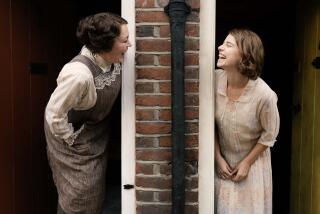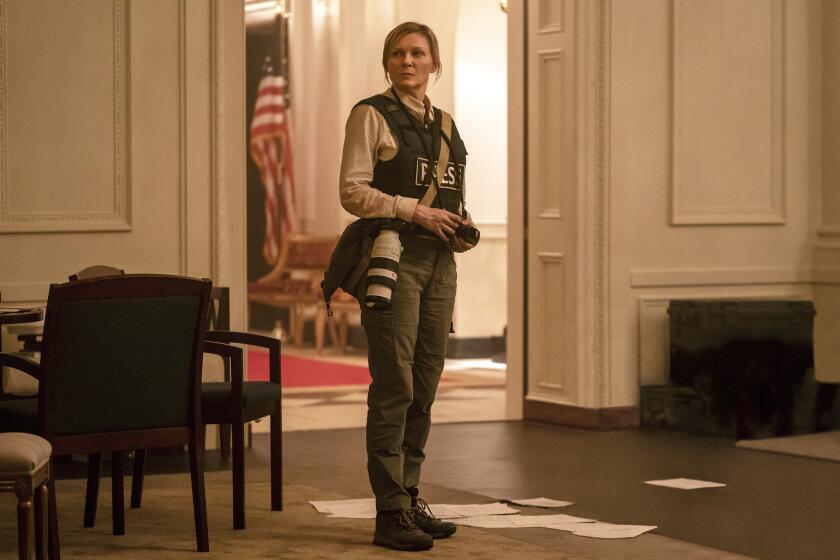Indie Focus: Going big with ‘Little’
Hello! I’m Mark Olsen. Welcome to another edition of your regular field guide to a world of Only Good Movies.
This coming Thursday, there will be a 30th anniversary screening of “Heathers” at Los Angeles’ Ace Hotel sponsored by the UCLA Film and Television Archive and Vidiots Foundation, with some of the creative team on hand for a Q&A after. I recently spoke to director Michael Lehmann, screenwriter Daniel Waters and actress Lisanne Falk for our entertainment podcast “The Reel.”
As Lehman said of getting to make the dark teen comedy, starring Winona Ryder and Christian Slater, “This question of could you make ‘Heathers’ today. The fact is is we couldn’t make ‘Heathers’ then, and people forget this or they think, ‘Oh, well, that was back in the days when you could make a movie like this.’ We couldn’t make that movie. We got very lucky.”
We’ll have more screening events of our own coming up soon. For info and updates, go to events.latimes.com.
‘Little’
In “Little,” a self-centered, bullying businesswoman is transformed by magic back into her very different 13-year-old self in order to learn the errors of her ways. Starring Marsai Martin, Regina Hall and Issa Rae, the movie is directed by Tina Gordon, who co-wrote the script with Tracy Oliver.
In his review for The Times, Justin Chang wrote that “the virtues of ‘Little’ can be found in the margins.” To that end, he added, “I’ve seen a few too many dimly shot, indifferently dressed studio comedies to take visual beauty for granted, or to pretend that it doesn’t express its own emotional meaning.” The main character’s “luxurious penthouse and open-concept corporate offices may be lifestyle pornography of a high order, but they also convey this movie’s look-at-me optimism, a lightness of comic spirit, better than its plot and dialogue do. That’s not the nicest of recommendations, but it’s also no little thing.”
The Times’ Sonaiya Kelley spoke to Martin, Hall, Rae, Oliver and Gordon for a story on the movie. Martin, now 14 years old and Hollywood’s youngest ever executive producer with her credit on the film, said, “I wanted to create something where black women felt welcome, where we all could feel comfortable in who we are. And to prove to other people that we can play different characters than the ones we play over and over again.”
For the New York Times, A.O. Scott wrote, “If the story is a mess, the performers — as is also customary in movie comedy — save the day .… All three women look terrific as well as ridiculous.
“Which may be part of the problem,” Scott added, “‘Little’ is overly protective of its characters and its audience; it’s soothing rather than sharp. That’s most likely because of an anxious concern for grown-up sensitivities. Smart 13-year-olds are likely to roll their eyes as well as laugh.”
For Vanity Fair, Richard Lawson wrote, “‘Little’ does a reverse tweak of the 1988 classic ‘Big.’ A glossy workplace comedy with a fantastical twist, the film deals in genres that don’t often feature black female characters at the center. So it also has a righteous charge, arriving as a (hopefully only first) breath of fresh air. It’s a silly, sweet lark that also has a ring of importance.”
‘Wild Nights With Emily’
Written and directed by Madeline Olnek, “Wild Nights With Emily,” is based on recent historical research that Emily Dickinson (played by Molly Shannon) in fact wrote many poems about her sister-in-law, Susan Gilbert (Susan Ziegler), and the two had a long affair. The true subject of Dickinson’s work would be written out of the historical record by her earliest publisher and public champion, Mabel Todd (Amy Seimetz).
Reviewing for The Times, Katie Walsh wrote that Olnek “issues a corrective to the historical record with her Emily Dickinson biopic ‘Wild Nights With Emily.’ Using historical research and records, Olnek systematically dissects the myth that the poet was a sexless and unloved recluse, peeling back the layers of narrative that surround her personal life to reveal a long-term romance.”
Reviewing for the New York Times, Teo Bugbee wrote, “The tension between what we see and what we hear of Emily’s life provides the film with much of its levity .… This is an irreverent film, but its lightness is meaningful. With each silly flourish, Olnek offers joy and companionship to a figure whose history was more conveniently presented to generations of readers as solitary.”
For the Wrap, April Wolfe said, “There are so many reasons to adore ‘Wild Nights With Emily,’ but the top may be Olnek’s refusal to adhere to the accepted history. It is as though our culture cannot imagine that queer people could possibly feel an easy joy with their romantic partner, that their lives must have been bereft without all those glorious heterosexual pleasures .… Olnek instead depicts a woman who loved and was loved, and who felt annoyed, ebullient, impatient, and, above all, full of life.”
‘Teen Spirit’
Making his feature debut as writer and director, Max Minghella examines the world of pop stardom in “Teen Spirit,” falling in with other recent films such as “A Star Is Born,” “Vox Lux,” and “Her Smell.” In “Teen Spirit,” Elle Fanning plays a young girl living on the Isle of Wight who dreams of being a singer. Coached by a former opera singer (Zlatko Burić), she enters a national singing competition. (Fanning does her own singing in the movie.)
In his review for The Times, Robert Abele noted that “the mix of stardom-seeking saga and unlikely-duo drama provides plenty of spark: Fanning and Burić nail the chemistry of outcasts awakened, driven by redemption, but also attuned to the volatility of blending the talent and ego needed to make it. And though the many aggressively stylish montages threaten to leech true emotion from Violet’s performances, Fanning still sells that in-the-zone edge true believers feel when the mike is theirs.”
Amy Kaufman spoke to Minghella about his directing debut. Of the influence of his father, the late filmmaker Anthony Minghella, Max Minghella said, “He’s like genuinely one of my favorite filmmakers, and I don’t know if there’s a bias thing or not .… I think we inherently have very different voices and sensibilities. I don’t think anybody is going to watch this and say ‘this feels like this was made by the guy who made ‘The English Patient.’’”
Reviewing for Culturess, Kristen Lopez added, “‘Teen Spirit’ could be called style over substance, but Minghella’s painterly eye and intoxicating aesthetic is infectious like the most immortal pop songs are. Elle Fanning stalks the stage with the ferocity of a true queen, and the soundtrack is killer. It’ll remind you why you love music.”
Email me if you have questions, comments or suggestions, and follow me on Twitter: @IndieFocus.
SIGN UP for the free Indie Focus movies newsletter »
More to Read
Only good movies
Get the Indie Focus newsletter, Mark Olsen's weekly guide to the world of cinema.
You may occasionally receive promotional content from the Los Angeles Times.







